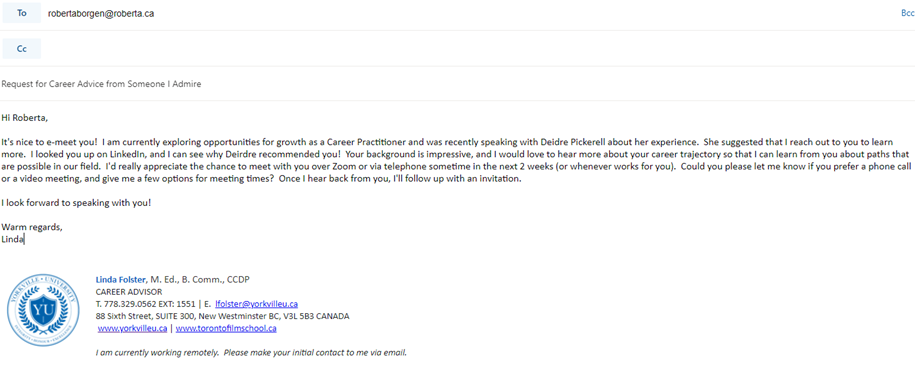
Connecting with employers, either by phone, email, or via social media, is a critically important part of your job search. You may be looking for an informational interview, inquiring about a job posting or whether they are hiring, or following-up on a previously submitted application or after an interview. In connecting with employers, you are actively creating opportunities to create the job, and career, you have always dreamed of, instead of passively waiting for employers to contact you.
Regardless of how you are reaching out, you will likely need to:
Prepare an introduction.
Which will likely include your name, any link to a shared connection, and perhaps your status as a student or recent graduate.
Share a specific goal.
Whether you are looking for work, a practicum site, or building your network.
Clearly state what you can do for the employer.
Which could include a brief snapshot of your experience.
Outline any specific requests or actions you are asking of the employer.
In this, strive to use an open-ended question (“Which day next week would work for you?”) instead of a closed-ended question (“Are you available to meet with me?”).
Although it may seem a bit “old school,” the phone can still be one of the best ways to connect with employers. In a world that is so reliant on digital communication, a phone call can be refreshing with a voice and tone that convey enthusiasm and excitement. All this adds a personal touch that is simply not possible via email.
In many cases, your employer outreach may be via “cold calling” which is calling someone you do not know to ask for something. This can be difficult to do, making it a task that many job seekers avoid. However, done well, it can be more successful than other outreach. The trick to making it easy is to be prepared, and to practice.
Here are a few tips to get you started:
- Prepare by scripting what you plan to say. Some points to include are:
- Make sure to practice your script, and time yourself. The time to rehearse is not when you are talking to your new contact! You should be able to deliver your pitch in 15-30 seconds. It’s recommended to take your list of contacts and prioritize them from most to least important – and then go through the list, starting with the least important contacts. This will allow you to get some practice and learn what works well vs. what you need to adjust – so that by the time you reach the most important contacts, you’ll have it perfected.
- You also want to make every effort to come across as warm, ideally sounding energetic and positive. Public speaking experts suggest standing and smiling while you talk, as this naturally gives you a more confident and positive energy. Be sure to research the industry, company, and the person you’re calling – to make it clear that you have targeted them for a specific reason that interests you. Be prepared to mention details that you discovered from your research.
- It’s very important to make your calls from a quiet place without distractions. For example, calling from a very noisy coffee shop or with loud children in the background leaves a negative, unprofessional impression. You may need to call from home and/or arrange for childcare.
- And finally, have your materials ready – including company information, your contact list; and a log or tracking sheet for recording your calls each time you hang up – because the more you do this, the easier it is to forget important details like what you discussed and where you left it with the person in terms of next steps.
- Prepare by scripting what you plan to say. Some points to include are:
Sample Cold Calling Script:
“Hi Betty Ann. My name is Linda Folster. Janet Lipton from the North Vancouver YWCA office suggested that I give you a call. I am looking for work and am in the process of trying to build my network. My credentials and most recent work experience are in career counselling, and I have had the Y on my radar as an employer of interest for a while now. I’ve been watching your postings over the past month, and although I don’t expect that you have an opportunity at the moment, I would like to request a meeting so that we could get acquainted. I feel I could learn a lot from you and would really value your advice! Which day next week would work for you? I’ll work around your schedule.” (30 seconds)
Here are some guidelines and a formula for requesting an informational interview via email:

Make sure your subject line is succinct and clear, for example “Request for Career Advice”. Busy professionals get a lot of emails, and they often prioritize by scanning the subject line. If you were referred by someone they know, put that in the subject line, for example “Jane Smith recommended I contact you”. Be descriptive and straightforward; avoid trying to be clever.
- Your email should contain a “hook” – in other words, something that draws them in. Use flattery (as long as you’re being sincere). For example, “Jane speaks very highly of you”, or “I was impressed by your LinkedIn profile, and feel I could learn a lot from you”.
- The next part of your email should be the “ask.” DO NOT ask for a job – just for information and advice – which most people are willing to give. For example, you might ask for a meeting so that you can learn about their career trajectory and possibilities in your field.
- Remember to follow up! This is a very important aspect of building a new relationship. You can do this by sending a thank-you email within 24 hours of your meeting, highlighting what stood out for you from your discussion, and requesting to stay in touch.

The term “Elevator Pitch” – which is sometimes called a 30-second summary – is a self-introduction intended to pique the interest of someone who could help you in your career. Although there are many theories about its origins, the idea is what you might say to someone who could be an important contact during a brief elevator ride.
Your elevator pitch should be a brief summary that outlines your skills and experience, shares interesting or important information, and presents you as a potential contact, colleague, or even candidate. Like TV commercials these are persuasive pitches intended to generate interest in the product . . . you! And like commercials, or short elevator rides, they should be brief.
Elevator pitches are important tools in any job seeker’s toolkit. They can be used at career fairs and networking events and for all those informal conversations that happen at the bus stop, in grocery store lines, or during flights.
Here are a few guidelines to get you started:
Be CONCISE. Although some say your pitch can last anywhere from 30 seconds to 2 minutes, 15 seconds is better. Once you’ve prepared it, rehearse it a few times and time yourself. Edit it down if it’s too long.
Be CLEAR. Use language that comes naturally to you, and that everyone will understand. Avoid jargon and words/phrases that aren’t part of your day-to-day vocabulary.
Include a HOOK. This is the part that literally snags your listener’s interest and makes them want to know more. Pique their curiosity! Get them to ask you for more information.
Any good elevator pitch will have fairly common structure that:
States WHO you are. Introduce yourself by name and add some context such as being a current student, recent graduate, or even aspiring professional. For example, I’m an aspiring Project Manager.
Outlines WHAT you do. Keep it simple and focus on one statement rather than giving a laundry list of skills.
Shares something UNIQUE about you. This could be a specific skill or talent or a statement about the benefit you bring to an employer.
Concludes with an invitation ENGAGE. Remember that many opportunities open up when you learn how to access the hidden job market and it all begins with building important relationships with industry contacts.
Here are a couple of examples:
“Hi, I’m Jesse. It’s great to meet you! I’m currently completing a Graphic Design Diploma at Toronto Film School. I’ve excelled in learning how to create digital video and visual effects for corporate websites. Eventually, I’d like to help my clients with their internet marketing and promotion and help them incorporate e-marketing into their overall marketing plan. I’m curious – who designs and maintains your website?”
“Nice to meet you! I’m Quinn. I think of myself as ‘Career Transition Recovery Specialist’. I work with people who are struggling with uncertainty about their future. I help them restore equilibrium in their careers and personal lives by teasing out who they are when they’re at their best. I prefer to work with career changers. What do you do?”
“Hi there, I’m Sam. I recently graduated from Yorkville with my Bachelor of Business Administration, specializing in energy management. I’m interested in helping small businesses become carbon neutral by investing in green technologies. I am exploring what’s out there in the market so that I can find an opportunity to use the skills I developed during my program. I’m curious to know what you do, and what you know about the green technologies space.”
Use this template to begin working on your own elevator pitch.
Opportunities don’t happen.
You create them.
